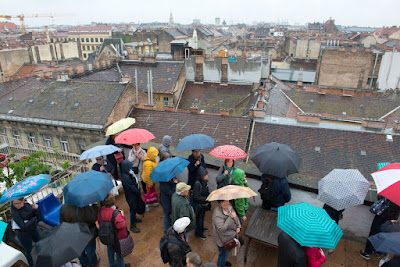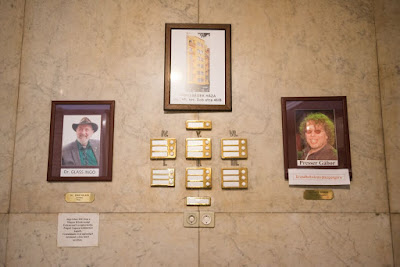Ökrös Csaba, my fiddle teacher and good friend, passed away on Wednesday night, two days ago. Csaba was,
perhaps, the definitive fiddler of the Hungarian folk music revival after the
late Béla Halmos. He was a band leader, a teacher,
a field collector in the tradition of Béla Bartok, an
arranger of music for theater and films. In a word, he was generally
acknowledged as the best damn fiddler in the Hungarian folk scene. The shock wasn’t
so much that he was young - he was 59 – but he seemed indestructible. Csaba was an absolute
original, and on the fiddle he was a genius.
Ökrös Csaba was in high school he first heard Béla Halmos - the father of the Hungarian folk music revival. Halmos provided the teenage Csabi with the address of folklorist Zoltan Kallos in Transylvania. Csaba hopped on a train and was soon off with Kallos to the village of Bonchida and being introduced to the world of the archaic instrumental tradition of Transylvania.
The fact that Csaba was exposed to the real thing at an early age was what made
his approach to the music special: he learned it at the age a local musician
would, he played it naturally. Csaba could articulate the subtle differences
that define style in Hungarian and Transylvanian folk fiddle in a way that
older fiddlers, working backwards from notated music, could not. He also had a
talent for teaching: he would break down a piece into its most basic parts,
showing the simplicity of what, to the modern, urban ear, sounded like some
incredibly difficult deluge of bow slurs and trills. When he formed the band
Ujstilus with Antal Fekete, Adorjan Pityu, and Géza
Pénzes they were the first to perform the
different repertoires of folk music in the local styles – Kalotaszeg, Mezoseg,
Gyimes - before Ujstilus people simply fiddled up a generalized, trill filled
“Transylvanian” fiddle. Csaba took the specifics of each village style and translated them into a form young non-villagers could understand.
I first heard the sound of Transylvanian village string bands while
visiting Hungary in the early 1970s, and while I played old-time Appalachian
fiddle in the New York area old time scene I could never quite make my
instrument phrase and play in a way that even came close to the original
recordings of music from Transylvania which I had brought back from Hungary as
a kid. Then, in 1983 in Boston, Ökrös and
Ujstilus showed up America to teach workshops in Hungarian folk fiddle with Ujstilus.
Hungarian-American dancer Eva Kish arranged for the band to spend a month in
the USA based at her home in Medford, Mass. They gave a workshop at MIT in
Cambridge, Mass, and when Csaba asked if anybody could play Hungarian music I
stepped up and played some tunes I had learned from a recording from Szék. From then on we were buddies.
The workshop led to a small tour with the band staying in Boston for a
couple of weeks. At the time I was involved with a lot of African music,
specifically Yoruba Juju music (I studied Yoruba language for several years.) and
had been playing fiddle with Demola Adepoju, the pedal steel guitar player of
Sunny Ade’s African Beats. Demola got an invite to play a recording session in
New York for Paul Simon and wanted me to come along. I told him, sorry, there
is this Hungarian band in Boston this week, so I ain’t going anywhere, have fun
with Paul Simon and try and get a copy of whatever you guys record because
obviously it will never be released commercially. Sometimes I make regrettable life
choices. (Demola can be heard playing pedal steel on Paul Simon’s “Graceland”) Csaba went on to form his own band, the Ökrös group, and also spent a lot of the 1990s as a guest fiddler with Muzsikas.
A few years later I moved to Budapest, ostensibly to learn more fiddle,
covertly to do linguistics fieldwork in Transylvania, and overtly to teach
English in the ELTE Law school. I lived around the corner from Csaba in Buda
and became his least accomplished student. There was perhaps, too much
partying. In his earlier years Csaba was the embodiment of a Dionysiac madman: he loved
music, parties, women, and drink, preferably all at the same time and in large
quantities. Especially women and drink. He was a small guy – and yet he could out-drink anybody he met. Not that
this was ever a good thing. I’m just saying. I have seen it. I once took him
out to an R&B club in Boston where he jammed with the band on stage, then
decided he was going to jump ship and stay and become an R&B star and play
rock and roll in America for the rest of his life. That phase lasted about an
hour. At other times he would get melancholic in that classic Hungarian way and
muse about the losses of Trianon and the unfairness of communism and end up
smashing things, including several of his (less valuable) violins. He often
punched close friends in the nose during arguments (not me!) Just about
everybody in the old guard of the Dance House scene has a few wild “Csaba
stories.” And yes, he pissed me off as well, but I always considered him my
friend.
He seems to have calmed down in later life – getting married and a
degree in folk violin pedagogy definitely tamed him. Csaba defined a generation of folk fiddlers Hungary – he was the link
between the village fiddlers and the younger city kids trying to wrap their
heads around the soul and technique of the old style Hungarian fiddle
tradition. We may miss Csaba but each time we reach for a violin we will always
bring him back in spirit.










